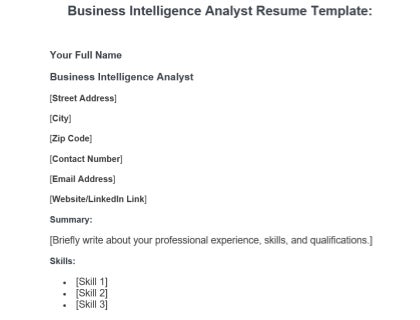
Business Intelligence Analyst Resume Template:
Download our business intelligence analyst resume template in Microsoft Word format.
Download NowBusiness Intelligence Analyst Resume Example:
Your Full Name
Business Intelligence Analyst
[Street Address]
[City]
[Zip Code]
[Contact Number]
[Email Address]
[Website/LinkedIn Link]
Summary:
[Briefly write about your professional experience, skills, and qualifications.]
Skills:
[Skill 1]
[Skill 2]
[Skill 3]
Experience:
Company Name / Job Title, Month 20XX - Present, Location
Company Name / Job Title, Month 20XX - Month 20XX, Location
Company Name / Job Title, Month 20XX - Month 20XX, Location
Education:
School Name / Degree, Month 20XX - Month 20XX, Location
School Name / Degree, Month 20XX - Month 20XX, Location
Certificates:
[Certificate 1]
[Certificate 2]
Awards:
[Award 1]
[Award 2]
How to Write a BI Analyst Resume:

A step-by-step guide to writing a professional business intelligence analyst resume.
Use the right format.
Start with contact information.

Your resume should start with an appropriate title, full name, and contact information. Include an email address, physical address, and telephone number.
Thereafter, you want to start with the information that will intrigue screeners and immediately address their key performance indicators.
General format:
Summary.
Competencies.
Professional experience.
Educational background.
Achievements.
Add a summary.
Capture the most compelling parts of your resume.

Write a brief summary that discusses your career experience and accomplishments. This is where you want to include all the attributes that make you the best candidate for the role. Screeners will read this section before they dive into your skills and experience.
List your skills.
Focus on your core skills.

Add your skills in a bullet format and be sure to use evocative words that best showcase your analytical and numerical abilities. Study the job description to determine the order of your skills. Start by listing the skills that meet the job description's responsibilities and requirements.
Only add honest answers as hiring managers may require you to complete a skills test.
Write about your experience.
List all your previous work experience with a date and location.

Business intelligence analysts are strategic professionals who excel when placed in deadline-driven work environments. These are traits candidates generally obtain through practical experience. We recommend adding the type of tasks you've worked on to show screeners the type of responsibilities you can handle.
Add your qualifications.
List your qualifications from the highest degree down.

Include the university/college name with the dates you attended. A business intelligence analyst is required to obtain a bachelor's degree in computer science, statistics, and business studies.
Write about your achievements.
Focus on the most noteworthy achievements.

What are your proudest career moments as a business intelligence analyst? List any certificates, awards, and/or achievements that shaped your career. This will help give your resume that additional push and solidify your chances of proceeding further in the hiring process.
Related Resumes:
- Salesforce business analyst resume.
- Data analyst resume.
- Healthcare business analyst.
- Business systems analyst.


